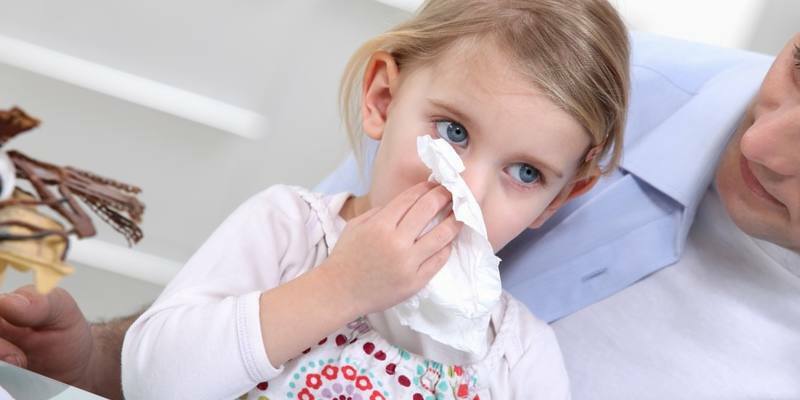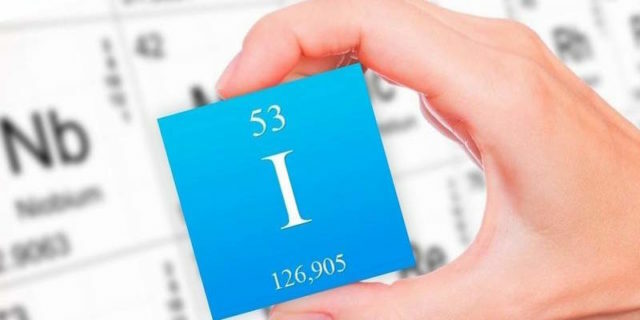
Contents of the page
- 1 What is the role of iodine in the human body?
- 2 What causes iodine deficiency?
- 3 Symptoms of iodine deficiency in humans
- 4 Why is iodine deficient?
- 5 How to identify iodine deficiency?
- 6 How to check the content of iodine in the body?
Thanks to television advertising, the need to maintain iodine balance, everyone knows. As well as the fact that the shortage of iodine in the body of women and men leads to disruption of thyroid function and hormonal imbalance, which provokes the development of serious pathologies.
What is the role of iodine in the human body?
The role of iodine in biological processes is extremely important. It is thanks to this element in the human body is the production of thyroid hormones, which are responsible for:
- metabolic efficiency;
- development and growth of cells in tissues;
- lipid, protein and water-salt metabolism;
- stability of the cardiovascular system;
- good memory and mental stability;
- emotional state of a person;
- conservation of energy balance.
It is thanks to iodine that the thyroid gland function properly, which produces hormones necessary for normal vital activity of the body.
What causes iodine deficiency?
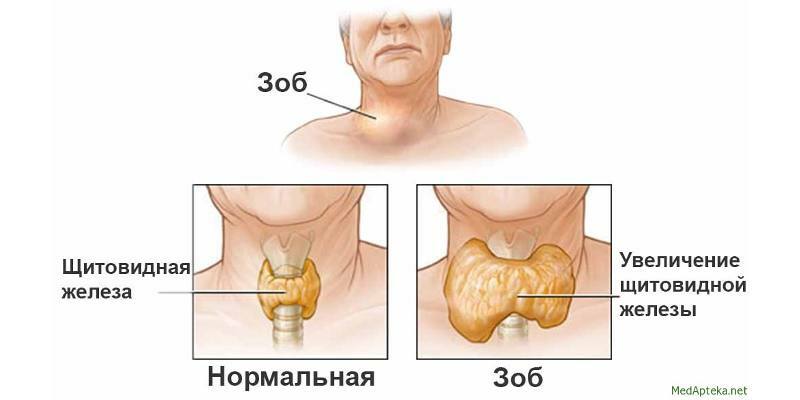
Deficiency of iodine in the body leads to the development of many pathologies, among which the most common ones are:
- mental retardation;
- delayed growth and development in children;
- thyrotoxicosis;
- endemic goiter;
- memory corruption;
- early menopause;
- impotence;
- psychoemotional instability;
- disorders in the heart rhythm, including atrial fibrillation;
- metabolic abnormalities;
- growth of cancer cells.
Iodine deficiency is especially dangerous for pregnant women. What is the result of the shortage of iodine in the body during the period of gestation? The consequences of this condition can be the most serious, up to a spontaneous miscarriage or fetal death in the womb of the mother.
Another danger lies in the fact that if the mother during pregnancy suffered from a lack of iodine in the body, the normal mental and physical development of the baby is disrupted. These deviations are especially pronounced in the period of growth and education of the child.
Iodine deficiency is also dangerous for men who want to become fathers, as the lack of this element can cause the cause of male infertility.
The lack of an important element causes a decrease in the concentration of thyroid hormones, which provide the body with energy. As a result, iodine deficiency leads to a syndrome of chronic fatigue, decreased immunity, the appearance of edema under the eyes or in the limbs.
In women, the initial stages of iodine deficiency provoke menstrual irregularities, and in severe cases lead to infertility and early onset of menopause.
Iodine deficiency is often accompanied by another pathology - anemia( lack of iron in the blood).In this case, the condition of a person is aggravated by symptoms such as dizziness, headaches, tinnitus, weakness, pale skin.
Symptoms of iodine deficiency in the human body

How does iodine deficiency appear? The basic infringements concern intellectual possibilities, that is the person marks deterioration of memory, loses ability to mastering of the new information. Experienced doctors can confidently determine the manifestations of iodine deficiency, even without the use of special tests and tests.
The main signs of deficiency of the most important element include:
- apathy, loss of interest in the events;
- complex deterioration of memory and mental abilities;
- constant apathy, drowsiness;
- diffuse attention, inability to focus on any task or goal;
- loss of vitality, depressive mood;
- extreme susceptibility to respiratory, infectious and viral diseases.
One of the most common symptoms of iodine deficiency in the body is excess weight, the appearance of which is facilitated not by the presence of adipose tissue, but by swelling associated with metabolic disorders. In severe forms of hypothyroidism, extensive swelling causes hearing damage, nasal breathing, hoarseness.
Complications of iodine deficiency are a drop in blood pressure, accompanied by fatigue, increased sweating and rapid heart rate.
It is important to remember that such problems as memory impairment, decrease of intellectual capabilities, are also associated with a lack of iodine, because against this background, the metabolism in the brain cells slows down and people gradually lose the ability to solve complex problems, creativity and assimilation of new information. There is irritability, a bad mood, a propensity for depression, passivity, a decrease in the emotional background. In this case, it is difficult for a person to get out of this state on his own and take steps aimed at receiving medical care and treatment.
From the medical point of view, the main sign of iodine deficiency is an increase in the volume of the thyroid gland and the formation of endemic goiter, which is accompanied by abnormalities such as an increase in the number of thyroid cells and an increase in the size of the thyroid gland, as well as the occurrence of concomitant focal pathologies, including tumors.
Such pathological changes are called hyperplasia or hypertrophy of the thyroid gland. The development of such pathologies is a defensive reaction of the body, a sort of mobilization of the endocrine system, aimed at maximizing the amount of iodine that exists in the body. However, if such a condition is delayed and takes a chronic form, then it develops into complex endocrine diseases.
Why is iodine deficient?
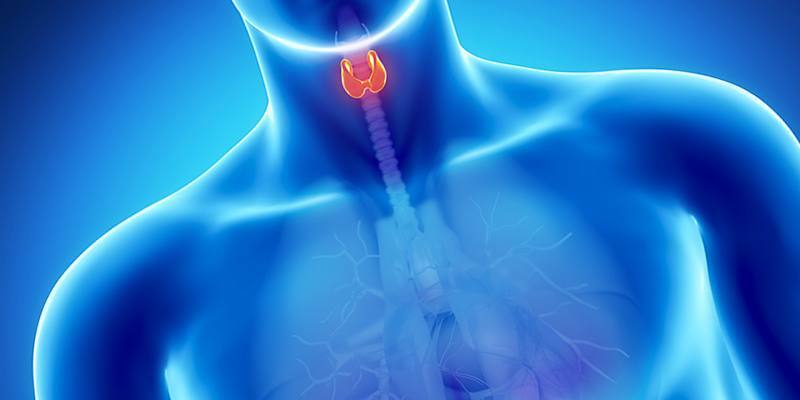
The lack of iodine in the human body causes certain reasons. The most common of these are:
- a hereditary predisposition to thyroid pathologies;
- is a genetic anomaly that interferes with the complete assimilation of iodine entering the body;
- is an unfavorable ecology, especially with regard to air composition;
- work in conditions of "harmful" productions, regular contact with certain substances that impede the absorption of iodine( for example, working with zinc reduces the digestibility of the element by half);
- inadequate intake of iodine in the body with food;
- pituitary and thyroid gland diseases.
What contributes to the lack of iodine?
Most often, iodine deficiency develops with an unbalanced diet, lack of seafood and seafood rich in iodine in the menu.
The lack of this element is noted in the population of those areas that are remote from the sea coast, where even the air itself is saturated with iodine vapors. Therefore, residents of the central regions of Russia, strongly recommend the use of salt when fortified with iodine.
A common cause of iodine deficiency in the body is considered to be bad habits. For example, smoking and the use of spirits are extremely unfavorable. Daily intake of even small doses of alcohol( less than 100 g) significantly increases the risk of developing diseases associated with iodine deficiency.
How to detect iodine deficiency?
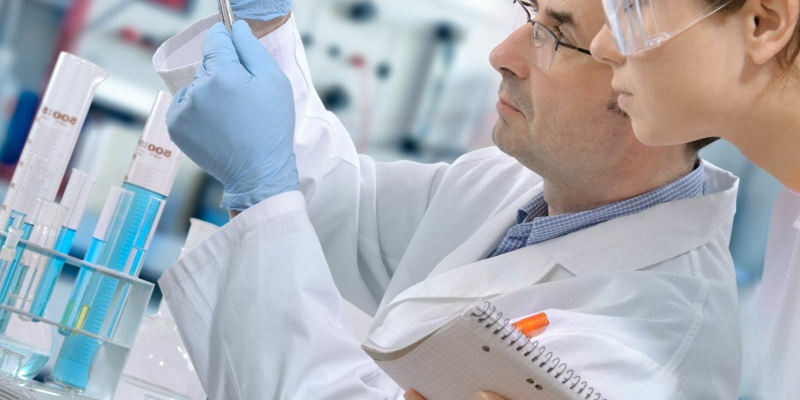
Iodine deficiency in the body can be detected using laboratory tests of blood and urine. The view that the rapid absorption of iodine in the skin is a sign of its lack, is mistaken! Do not rely on this questionable test and on its results start unreasonable intake of iodine supplements. As a result, the body receives an overabundance of this element, which is no less dangerous than its lack.
The rate of presence of this element in the body is from 2 to 4 μg per kilogram of weight. The daily requirement for iodine intake depends on the person's age, on average it is:
- 25-45 mcg - for babies up to a year;
- 85-95 μg - for children from 1 year to 5 years;
- 115-125 mcg - for school-age children;
- 145-155 μg for an adult of active age;
- 110-120 mcg - for the elderly.
The own constant content of iodine in the human body is not very high from 14 to 21 mcg, its main quantity, used by the thyroid gland daily, comes from outside, along with food.
How to check the content of iodine in the body?
To check your body if you suspect a lack of iodine, you should consult an endocrinologist and undergo a series of tests:
- a special urine test;
- blood test with hormone test;
- Thyroid ultrasound.
No home tests and experiments with iodine-containing drugs are able to confirm signs of iodine deficiency or their absence. Therefore, one should rely only on professional research methods and take the necessary measures only when the suspicion of iodine deficiency is confirmed by laboratory tests.
How to make up iodine in the body?

Endocrinologist should advise on this issue. Only a specialist can recommend suitable drugs for self-administration, taking into account the individual characteristics of the patient, the presence of concomitant diseases and possible contraindications. Therefore, if there is a suspicion of iodine deficiency, the first thing to do is to visit the doctor's office and take all the tests.
Typically, experts recommend the following:
- vitamin complexes with a base in the form of an extract of kelp( seaweed) and with the addition of sea salt;
- complexes containing organic iodine compounds, for example, "Iod-Active";
- preparations with active compound of iodine and potassium, such as "Jodomarin" or "Iodobalance".
Vitamin complexes with iodine content( compounds in a single molecule of potassium and iodine) are much more stable and provide a better result than using dietary supplements with organic iodine. Preference should be given precisely to these drugs, since they differ in complex effects and additionally have a beneficial effect on cardiac activity and blood composition due to the potassium content.
The medical treatment of iodine deficiency, which has become pathological, is carried out exclusively under the supervision of an endocrinologist. In particularly severe and neglected cases associated with thyroid diseases, the patient is placed in a hospital and, if necessary, surgical intervention is performed.
What foods should be in the diet?
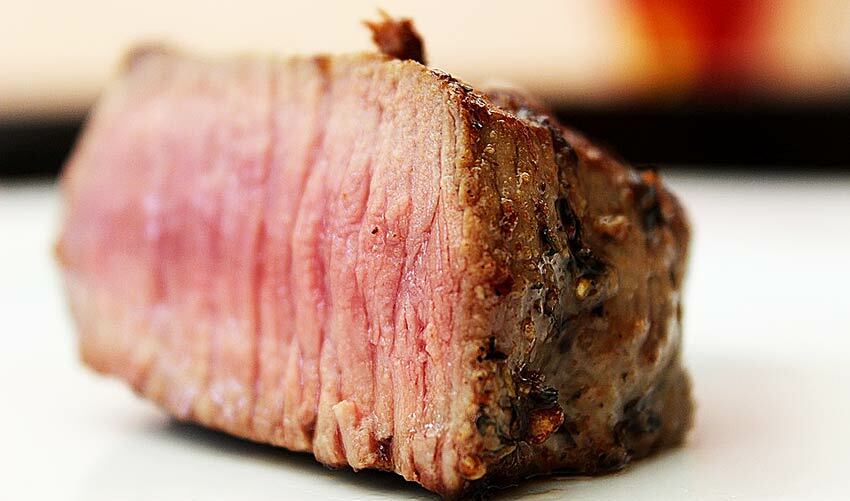 Photo: Meat
Photo: Meat To prevent possible deficiency of iodine, it is usually enough to consume products containing this element. The menu should include:
- seafood, fish( especially marine);
- red meat;
- salads with sea kale;
- celery;
- mineral water with iodine in the composition( for example - "Azov");
- persimmon;
- bananas;
- walnuts;
- tomatoes;
- mushrooms;
- carrots;
- beet;
- potatoes;
- kohlrabi, broccoli, cauliflower and Brussels sprouts;
- radish and daikon;
- cranberry;
- green string bean;
- eggs;
- black currant;
- chokeberry;
- liver;
- iodized salt;Iodine-enriched dairy products.
Correctly selected and balanced diet will help to prevent iodine deficiency in the body and avoid serious thyroid diseases.
How to make a diet with iodine deficiency?
The basic rule in the formulation of the daily diet is the use of exclusively iodized salt. In the kilogram of this product contains from 25 to 60 mg of completely absorbed by the body of iodine.
The daily norm should be the use of dishes from fish, sea gifts and other products rich in iodine. With light forms of lack of this element, it is quite possible to eat food containing this important element throughout the day.
Here's how the approximate menu looks for one day:

- Breakfast - salad of fresh carrots with tomatoes, scrambled eggs with celery;
- Lunch - fresh beet salad with nuts, creamy broccoli cream soup, liver with mushrooms and mineral water;
- Snack - persimmon and iodine-containing yogurt;Dinner - fish fillet with sea kale and stewed vegetables( cabbage, beans).
Such a diet will ensure sufficient intake of iodine in the body and have a beneficial effect on overall health. To develop the optimal diet, you can contact an experienced nutritionist, or do it yourself, choosing foods that are high in iodine for cooking. The necessary information can now be easily found on numerous thematic sites on the Internet.
It should be taken into account that heat treatment reduces iodine content in the product, and in the literature on diet and nutrition, the amount of substances contained is indicated exclusively for raw ingredients.
Traditional healers recommend replenishing iodine deficiency in simple ways. For example, in order to get a daily dose of this microelement, it is enough to eat a small apple, get 5 seeds from its core, thoroughly chew them and swallow them.
Or collect young( green) walnuts, scroll them through a meat grinder, combine with honey in a 1: 1 ratio and take 1 tsp every morning.for a month.

